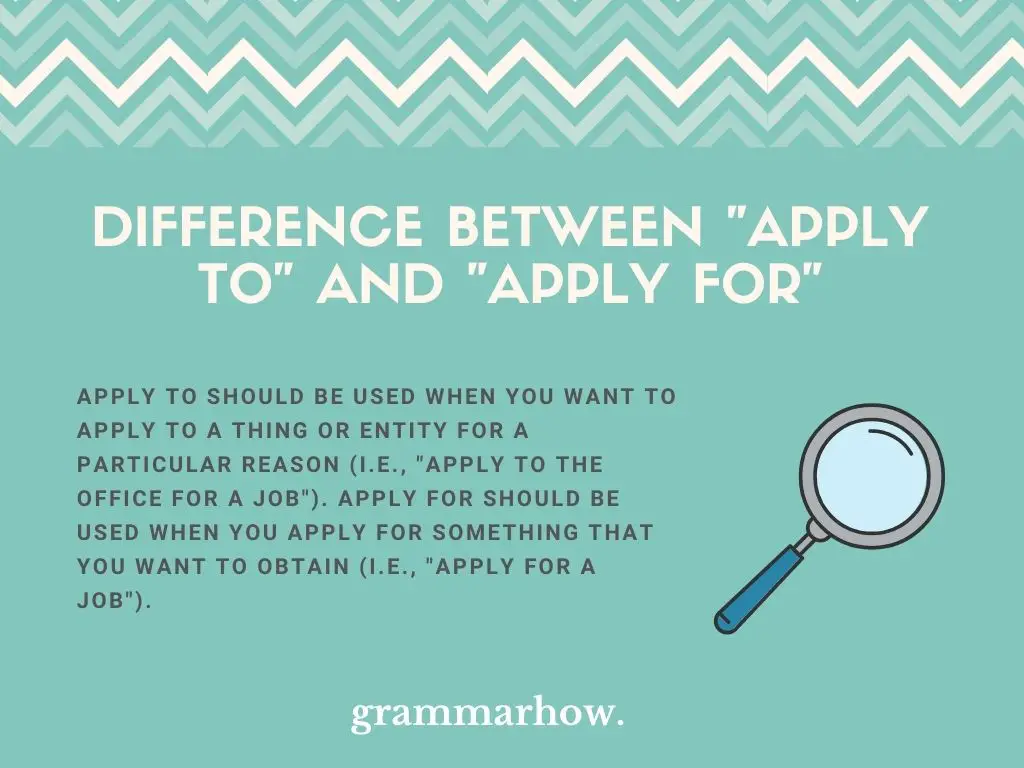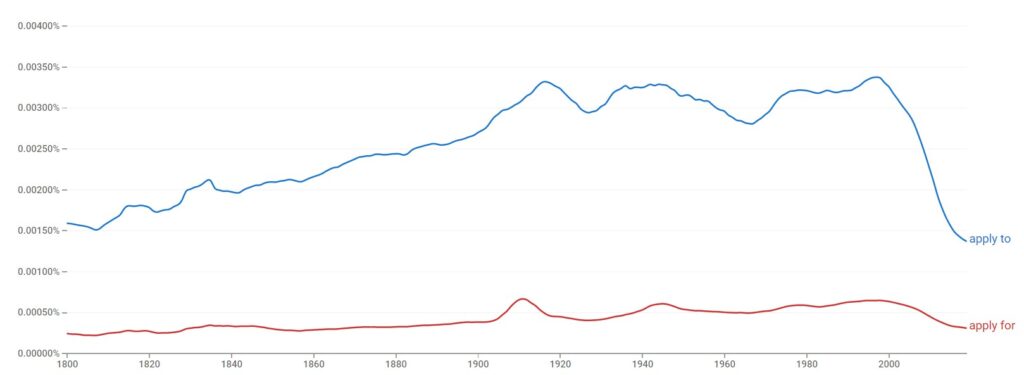Using the correct preposition after “apply” is important to understand when you’re learning about language rules. We’ll show you the two most common prepositions, “apply to” and “apply for,” and when to use them.
What Is The Difference Between “Apply To” And “Apply For”?
Apply to should be used when you want to apply to a thing or entity for a particular reason (i.e., “apply to the office for a job”). Apply for should be used when you apply for something that you want to obtain (i.e., “apply for a job”).

If you look through this graph, you’ll see that “apply to” is the more common of the two phrases to use. However, that doesn’t mean the two are synonymous, and you can’t use either one.

“Apply to” just comes up in more situations where it is used. Generally, people still use “apply for” often, and you can see how steady it has stayed on the graph (while “apply to” has been shakier).
What Does “Apply” Mean?
It’s great to know what the prepositions do to change the direct meaning, but what does “apply” mean in the first place?
According to The Cambridge Dictionary, “apply” means “to request something, usually officially, especially in writing or by sending in a form.”
Generally, we apply to things that we desire or want. It’s most commonly used after writing out a form (even though most forms are now created online). Still, an application is something that we send off when we’re applying for something.
Is It “Does Not Apply To” Or “Does Not Apply For”?
The same rules apply when we include the phrase “does not” before either “apply to” or “apply for.” However, the rules get a bit tricky when we look at what “apply for” means.
We use “does not apply to” when talking about not applying to a specific entity. We use “does not apply for” when talking about applying for something we want. However, since we aren’t getting what we want, we can’t “apply for” it; therefore, “does not apply for” is wrong.
- This does not apply to you.
- This does not apply to everyone.
- This does not apply for jobseekers.
If you look at these three examples, you can see what we mean. “Does not apply to” works in every situation because we’re always talking about things or entities that we can’t apply things to.
However, we can’t use “does not apply for” in any way because “apply for” implies that we want something. If we use “does not,” it means we can’t get something, and therefore the “want” is removed from the meaning, making “does not apply for” obsolete.
7 Examples Of How To Use “Apply To” In A Sentence
Let’s go through some examples of how to use both phrases in sentences. We’ll start with using “apply to” so you can see how it works when we’re talking about specific things.
- I would like to apply to this company for the position of CEO.
- I need to apply to the bank for my loan later.
- Have you applied to any competitions yet?
- You should apply to get benefits from the government.
- We could apply ourselves to whatever we want.
- He wants to apply to us for a position here.
- You can’t apply to live in this country until you’ve passed the exam.
Generally, we use “apply to” when talking about an entity or thing we want to apply for. It’s also typical for the word “for” to appear straight after we’ve stated the entity.
For example,
- Apply to the bank for a loan.
Both “to” and “for” are present in this sentence. The only difference is that “the bank” comes between them to break them up. If we wrote the sentence like this:
- Apply for a loan.
It would still make sense, but now we’re using “apply for” instead because we’re stating something we want.
7 Examples Of How To Use “Apply For” In A Sentence
Let’s look at a few more examples of using “apply for” in a sentence.
- I need to apply for a job.
- I should apply for benefits.
- I want to apply for a loan.
- You should apply for a job with me.
- We should apply for the army!
- I want to apply for all of the things on this list.
- I have a list of things I need to apply for.
In these cases, we’re talking about things we want to do. That’s when we use “apply for.” It’s more common for us to use “apply for” in speaking and “apply to” in writing because “apply to” allows us to be more specific. “Apply for” doesn’t need as much specification, which works well in spoken language.
Which Other Prepositions Can Be Used After “Apply”?
There are a few other prepositions that come after “apply,” and we thought we’d cover some of the most common ones.
- I will apply through the embassy. (Apply through)
If we’re going through a place to apply for something.
- I want to apply with this document! (Apply with)
If we’re using something specifically to apply.
- You can apply in nine days (Apply in)
If there’s a time frame before applications are allowed.
When Should You Use “Apply” vs. “Applies”?
We use “apply” when writing in the first-person singular, first-person plural, or third-person plural.
- I apply
- We apply
- You apply
- They apply
We use “applies” when writing in the third-person singular form.
- He applies
- She applies
- It applies
Apply To/For – Synonyms
Finally, let’s look at some synonyms that have the same meaning. These are great to learn to help you expand your vocabulary.
- Register to / for
You can “register for” some things, and you can also “register to” others. This works well as a synonym.
- Petition to / for
Again, we can “petition for” and “petition to.”
- Try to / for
In this context, “try” means the same thing as “apply.” We can “try for a job” to try and get a job. It shows that we’re putting in the effort to apply for something.

Martin holds a Master’s degree in Finance and International Business. He has six years of experience in professional communication with clients, executives, and colleagues. Furthermore, he has teaching experience from Aarhus University. Martin has been featured as an expert in communication and teaching on Forbes and Shopify. Read more about Martin here.
